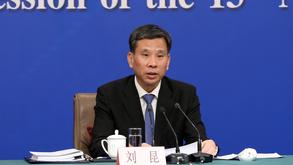 Minister of Finance Liu Kun answers questions at a news conference in Beijing on March 7, 2019. (WANG ZHUANGFEI / CHINA DAILY)
Minister of Finance Liu Kun answers questions at a news conference in Beijing on March 7, 2019. (WANG ZHUANGFEI / CHINA DAILY)
China will continue to use proactive measures to support economic growth with an eye on fiscal sustainability, while leaving enough policy room to address challenges and promote reforms, a top government official said in a written article.
Finance Minister Liu Kun said in his article, published in People's Daily, that the efforts would be focused at keeping fiscal deficit, gross debt and government expenditure at reasonable levels, without any sharp shifts in policies.
The minister's comments came ahead of the release of the major economic indicators for the first quarter. Many economists had projected a robust recovery as manufacturing activity and services gathered speed, largely due to the successful containment of COVID-19 and fast vaccination.
Finance Minister Liu Kun said in a written article that efforts would be focused at keeping fiscal deficit, gross debt and government expenditure at reasonable levels, without any sharp shifts in policies
Liu called for strengthening research and analysis of the macroeconomic situation, and using more policies to hedge potential challenges. In this regard, the minister highlighted the need to inject more funds in sectors like technology innovation and improving the tax income system for local governments.
ALSO READ: Stability, sustainability key to solid macroeconomy
Consumption tax collection reforms will be stepped up to further expand the income avenues for local governments. Stamp tax and tariff legislation will also get due attention from the country along with an expansion of the tax management rights of provincial-level governments, said Liu.
In order to mitigate the pandemic impact, China has made greater use of public investment, in addition to providing relief for households and businesses, to support the recovery soon after the epidemic was brought under better control.
After a large fiscal expansion in 2020, a mild tightening is expected in 2021 based on government policy announcements, economists with the International Monetary Fund said in a report published on Wednesday.
Finance ministers and central bank governors of the G20 countries met online on Wednesday, for their second meeting under the Italian G20 presidency, at a time when the global economic outlook has improved, thanks to the vaccine rollouts and continued policy support.
Participants at the meeting committed to avoiding any premature withdrawal of support measures as the recovery has been uneven with existing downside risks. They, at the same time, recognized the critical role of quality infrastructure investments in the recovery phase, and jointly called for resilient, sustainable and inclusive infrastructure to be the key to stimulating economic growth and development.
The G20 members called on the IMF to make a comprehensive proposal for a new Special Drawing Rights general allocation of US$650 billion to meet the long-term global need to supplement reserve assets. They agreed to extend the temporary debt relief-the debt service suspension initiative-by six months to low-income countries till the end of this year.
Yi Gang, governor of the People's Bank of China, the central bank, welcomed the re-establishment of the Sustainable Finance Study Group, which was upgraded to a working group co-chaired by the PBOC and the US Department of the Treasury, according to a statement released on the bank website.
READ MORE: G20 eyes boosting IMF war chest, extending debt-servicing freeze
The PBOC governor also expressed his support for the new allocation of SDRs and urged G20 members to channel the instruments to benefit low-income countries in an appropriate manner. Yi also called for IMF governance reform under the 16th General Review of Quotas.
The group is expected to develop a G20 sustainable finance roadmap, as well as improve sustainability reporting, identify sustainable investments, and align international financial institutions' efforts with the Paris Agreement.
The G20 finance ministers and central bank governors are also expected to hear from the Financial Stability Board about how regulatory, supervisory and oversight frameworks address the so-called "global stablecoins", and have broad discussions on the cross-border use of central bank digital currencies and their wider implications for the international monetary system, according to the communique.


